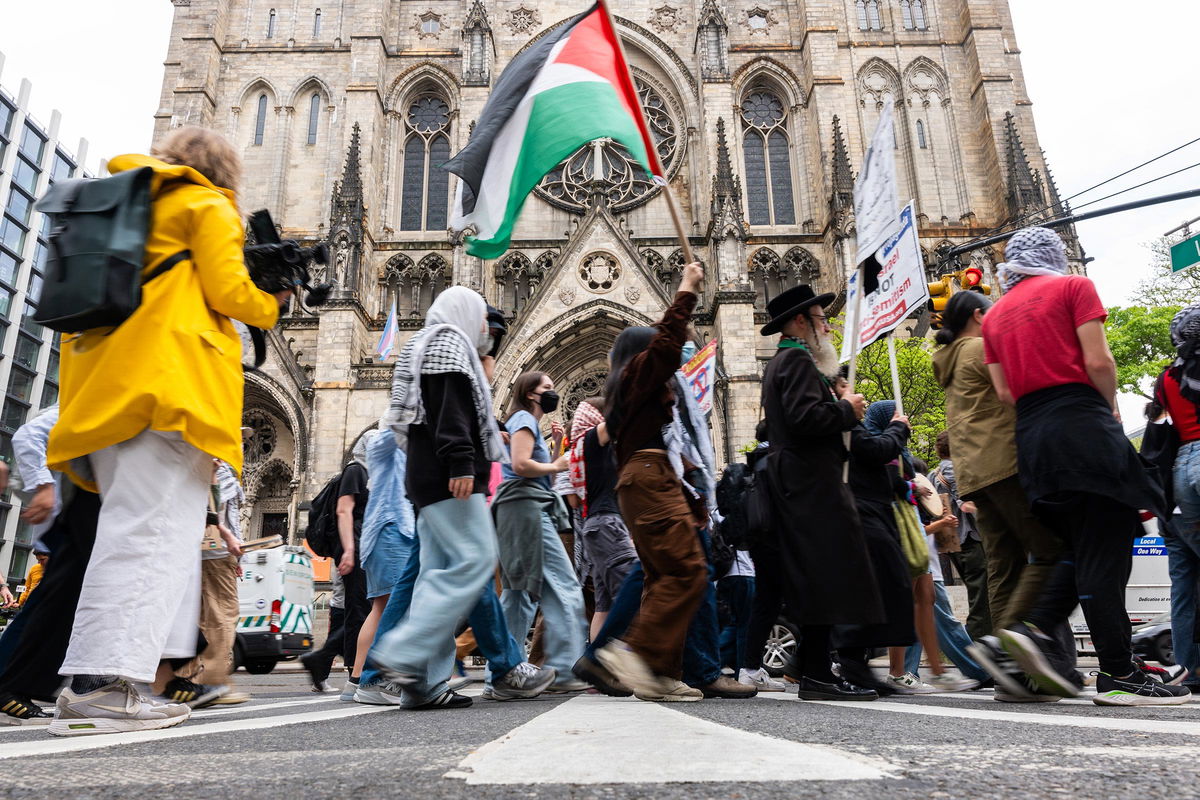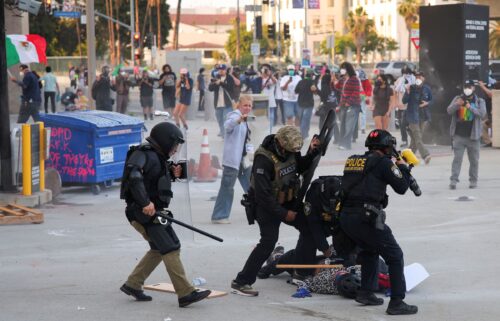Trump has threatened the visas of international student protesters. A post-grad at risk shares his fears

Momodou Taal speaks with CNN in November 2023.
By Akansha Singh, CNN
(CNN) — Momodou Taal applied to come to the United States from Great Britain to study at Cornell University in upstate New York. His chosen course was a Ph.D. in Africana studies — the study of Black people in Africa, the African diaspora and around the globe — and he was awarded a visa.
“I came to study in the US, as oftentimes there is an understanding that what happens in the US becomes a global conversation,” he told CNN. “As someone interested in topics surrounding race, I wanted to get the US perspective firsthand whilst being able to contribute to that conversation.”
But after taking part in protests of Israel’s war against Hamas in Gaza, he was suspended, threatening his visa and his right to stay in the US to study — a scenario that some believe could become more common during President-elect Donald Trump’s second term.
Trump railed against the student protests on the 2024 campaign trail, and the Republican National Convention’s platform pledged to “Deport Pro-Hamas radicals and make our college campuses safe and patriotic again,” inciting uncertainty about the future among international students. While Trump has also suggested that international students who graduate from US institutions be given green cards, his plans have focused far more on removing undocumented immigrants than welcoming new Americans.
Taal, who was born in The Gambia, was one of thousands of students who demonstrated in support of Palestinian civilians after Hamas attacked Israel on October 7, 2023, and Israel sent its troops into Gaza to eradicate Hamas. As protests took over dozens of campuses across the nation last fall, he told CNN that the movement he belongs to was anti-racist and that he abhorred the killings of civilians on all sides.
But to Cornell, he and other students went too far. In April, then Cornell President Martha E. Pollack wrote a letter to her community bemoaning the protests for breaking college rules, being loud enough to be heard in classrooms and “diverting substantial public safety and student life staff and resources from other important matters.”
Taal was suspended first for his role in a pro-Palestinian encampment and later for disrupting a careers fair attended by defense contractors, according to the independent campus newspaper The Cornell Daily Sun.
With the second suspension, Taal’s visa became invalid, and he was advised in a letter by Cornell administration to leave the US as soon as possible.
International students across the country may face this same dilemma — they want to speak up for their beliefs, but if they cross their college, they may lose not only their place but their right to study in the US. And the pressure may be ramped up with the incoming Trump administration.
“It is a legitimate concern,” said Jill Allen Murray, deputy executive director for public policy at NAFSA: Association of International Educators, especially given Trump’s nationalist rhetoric from the campaign trail.
She said it was too early to know what could happen to international students participating in protests, but her organization was ready.
“We will continue to equip our members at US colleges and universities with information to help advise international students of the visa and immigration implications of their First Amendment activity on- and off-campus,” Murray said.
The Presidents’ Alliance on Higher Education and Immigration — a group of American university and college leaders — issued a statement the day after Trump’s election stressing their commitment to all students who are non-citizens, saying their involvement in US education brought fresh perspectives and was “essential” to the future workforce and leadership of the US.
“If measures were introduced to penalize international students for engaging in lawful expression, the alliance would work with our partners to support these students and campuses,” Miriam Feldblum, the group’s executive director, told CNN.
Taal’s suspension came months after anonymous threats were made to kill Jewish students at Cornell, terrorizing people on its upstate New York campus. Those threats were traced to a then-student who suffers from mental health issues, his defense lawyer said. The student was sentenced to 21 months in prison but tensions remained high on campus.
“The university becomes a battleground amongst many, and it’s a battleground of ideas and right now, I think there’s a trend to rethink the types of students that these places want to create,” Taal told CNN. “It doesn’t seem like the university, particularly Cornell, is thinking about, or wanting to build the types of students that are morally conscious and care about the issues of the world.”
For its part, Cornell says on its website its mission is “to discover, preserve and disseminate knowledge, to educate the next generation of global citizens, and to promote a culture of broad inquiry throughout and beyond the Cornell community.”
Taal had support on campus from his faculty advisers and off campus from people like Independent Vermont Sen. Bernie Sanders. Cornell has now reinstated his student status — preserving his visa — but he says he is not allowed on campus or to teach as other graduate students do. Taal said he has “no faith” in Cornell’s administration.
“There’s a way in which the university presents what’s happening under the guise of law and order, because when you talk about law and order, you’re appealing to a particular crowd of people, normally, right-wing forces in this country. But fundamentally, what it’s about is that law and order is being weaponized and operationalized to clamp down on pro-Palestinian speech,” he said.
CNN reached out to Cornell for comment regarding Taal’s case. The college declined to answer questions but pointed to a statement from Interim President Michael I. Kotlikoff on September 30 and a statement from Joel M. Malina, Vice President for University Relations on October 10.
The statement by Kotlikoff said the disruption of the career fair where Taal was present “was not a peaceful or harmless rally, as some have described it,” and the communications said there were various levels of appeal available to students.
Taal said he expected an impact from Trump’s re-election. “I know that this is always going to … with the kind of ‘America First’ agenda, disproportionately affect those in precarious positions, such as international students.”
And Taal, who specifically chose the US for his doctorate study, says he’s becoming more disillusioned with the United States.
“I was under the impression that the US values free speech, that since has changed,” he said. “Speech that is hateful is promoted but speech that is critical of US foreign policy isn’t tolerated.”
The-CNN-Wire
™ & © 2024 Cable News Network, Inc., a Warner Bros. Discovery Company. All rights reserved.

